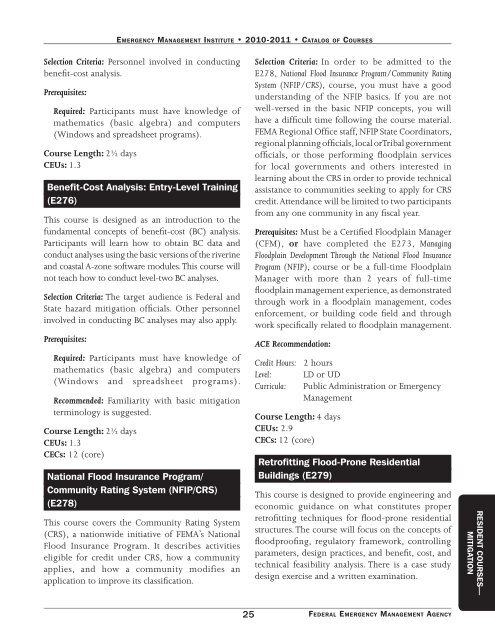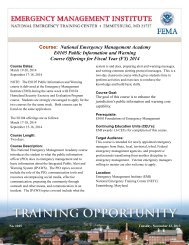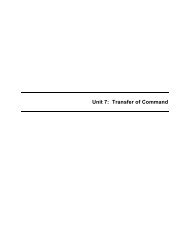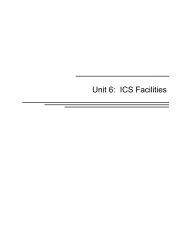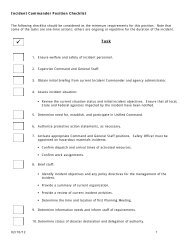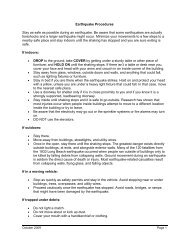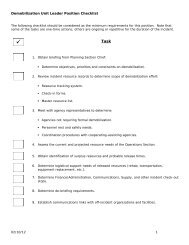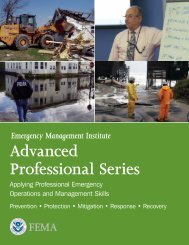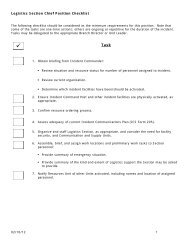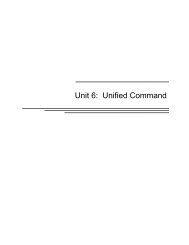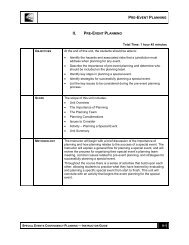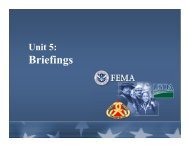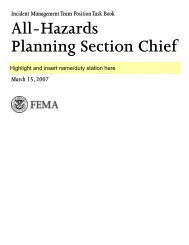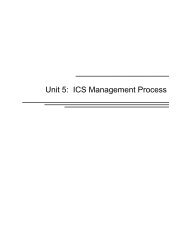enrollment for emi courses - Emergency Management Institute ...
enrollment for emi courses - Emergency Management Institute ...
enrollment for emi courses - Emergency Management Institute ...
You also want an ePaper? Increase the reach of your titles
YUMPU automatically turns print PDFs into web optimized ePapers that Google loves.
EmE r g E n c y ma n a g E m E n t In s t I t u t E • 2010-2011 • ca t a l o g of co u r s E s<br />
Selection Criteria: Personnel involved in conducting<br />
benefit-cost analysis.<br />
Prerequisites:<br />
Required: Participants must have knowledge of<br />
mathematics (basic algebra) and computers<br />
(Windows and spreadsheet programs).<br />
Course Length: 2½ days<br />
CEUs: 1.3<br />
benefit-cost analysis: Entry-level training<br />
(E276)<br />
This course is designed as an introduction to the<br />
fundamental concepts of benefit-cost (BC) analysis.<br />
Participants will learn how to obtain BC data and<br />
conduct analyses using the basic versions of the riverine<br />
and coastal A-zone software modules. This course will<br />
not teach how to conduct level-two BC analyses.<br />
Selection Criteria: The target audience is Federal and<br />
State hazard mitigation officials. Other personnel<br />
involved in conducting BC analyses may also apply.<br />
Prerequisites:<br />
Required: Participants must have knowledge of<br />
mathematics (basic algebra) and computers<br />
(Windows and spreadsheet programs).<br />
Recommended: Familiarity with basic mitigation<br />
terminology is suggested.<br />
Course Length: 2½ days<br />
CEUs: 1.3<br />
CECs: 12 (core)<br />
national flood Insurance program/<br />
community rating system (nfIp/crs)<br />
(E278)<br />
This course covers the Community Rating System<br />
(CRS), a nationwide initiative of FEMA’s National<br />
Flood Insurance Program. It describes activities<br />
eligible <strong>for</strong> credit under CRS, how a community<br />
applies, and how a community modifies an<br />
application to improve its classification.<br />
25<br />
Selection Criteria: In order to be admitted to the<br />
E278, National Flood Insurance Program/Community Rating<br />
System (NFIP/CRS), course, you must have a good<br />
understanding of the NFIP basics. If you are not<br />
well-versed in the basic NFIP concepts, you will<br />
have a difficult time following the course material.<br />
FEMA Regional Office staff, NFIP State Coordinators,<br />
regional planning officials, local or Tribal government<br />
officials, or those per<strong>for</strong>ming floodplain services<br />
<strong>for</strong> local governments and others interested in<br />
learning about the CRS in order to provide technical<br />
assistance to communities seeking to apply <strong>for</strong> CRS<br />
credit. Attendance will be limited to two participants<br />
from any one community in any fiscal year.<br />
Prerequisites: Must be a Certified Floodplain Manager<br />
(CFM), or have completed the E273, Managing<br />
Floodplain Development Through the National Flood Insurance<br />
Program (NFIP), course or be a full-time Floodplain<br />
Manager with more than 2 years of full-time<br />
floodplain management experience, as demonstrated<br />
through work in a floodplain management, codes<br />
en<strong>for</strong>cement, or building code field and through<br />
work specifically related to floodplain management.<br />
ACE Recommendation:<br />
Credit Hours: 2 hours<br />
Level: LD or UD<br />
Curricula: Public Administration or <strong>Emergency</strong><br />
<strong>Management</strong><br />
Course Length: 4 days<br />
CEUs: 2.9<br />
CECs: 12 (core)<br />
retrofitting flood-prone residential<br />
buildings (E279)<br />
This course is designed to provide engineering and<br />
economic guidance on what constitutes proper<br />
retrofitting techniques <strong>for</strong> flood-prone residential<br />
structures. The course will focus on the concepts of<br />
floodproofing, regulatory framework, controlling<br />
parameters, design practices, and benefit, cost, and<br />
technical feasibility analysis. There is a case study<br />
design exercise and a written examination.<br />
FEd E r A L Em E r g E N C y mA N A g E m E N T Ag E N C y<br />
rEsIDEnt cOursEs—<br />
mItIgatIOn


